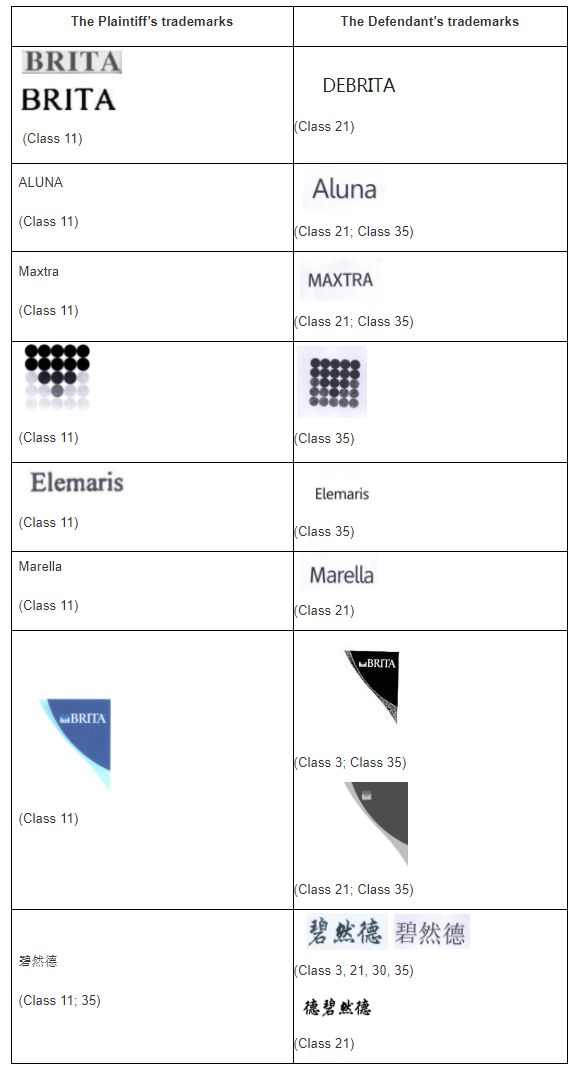Heinz Hankammer has founded the famous water filtration brand BRITA in 1966. Nowadays BRITA distributes products to more than 60 countries including China, and the brand is getting more and more popular.
Recently, BRITA has won a trademark infringement and unfair competition case against a malicious trademark squatter in China, where the court supported its claim that the trademark squatter shall assume damage for its trademark infringement, false advertisement, and the costs borne by the Plaintiff due to Defendant's application, opposition and invalidation proceedings initiated with malice.
This case plays a significant role because it is the first case in PRC that clearly states that the abuse of trademark administrative procedures by infringers constitutes unfair competition.
| Plaintiff: | BRITA GMBH (Trademark Owner) BRITA China Co., Ltd. (Solely owned subsidiary) |
| Defendant: | Shanghai Kangdian Industrial Co., Ltd. (上海康点实业有限公司) |
| Cause of Action: | Trademark Infringement and Unfair Competition |
| Court: | Shanghai City Minhang Dist. People's Court |
| Claims: | 1. Confirm the trademark infringement conducted by
the Defendant; 2. Confirm the unfair competition conducts of the Defendant; 3. Public apology on China IP Daily; 4. The Defendant assume damage for RMB 3 million. |
In China, the earliest "BRITA" trademark (No.
631696; Class 11) was approved for registration in 1993. After
that, BRITA GMBH has registered many trademarks on domestic and
commercial water filters and related products and services under
class 11 and class 35 successively.

The defendant, Shanghai Kangdian Industrial Company (Shanghai Kangdian) is a company set up in 2010. It applied 21 similar trademarks as BRITA since 2012 and some of them even got registered.
Afterwards, it made sale of its owned filters bearing BRITA's trademark on 1688.com claiming association with BRITA, and also opened WeChat accounts using BRITA's trademark. Such accounts were cancelled due to complaint by BRITA but opened again 1 year later.
It starts challenging Brita GmbH's registered trademarks through administrative procedures, such as oppositions.
Enough of the harassment carried out by Shanghai Kangdian, BRITA GMBH and BRITA China filed a lawsuit before Shanghai City Minhang District People's Court against Shanghai Kangdian for trademark infringement and unfair competition on August 24, 2017.
The Plaintiffs have mainly submitted the following pieces of evidence to support their arguments.
- Evidence showing that The BRITA trademark has been known to the relevant public through the Plaintiffs' commercial use and advertising for years, including advertising newspapers, magazines, website pages, exhibitions related materials, sales data from Tmall, JD, No.1 Store and Dangdang, etc.
- Evidence of facts relating to the alleged infringement, including notarised evidence of sales and publicity on the defendant's WeChat and online platforms; evidence of the defendant's application for registration of the trademark; evidence of the defendant's request for invalidation of the plaintiff's trademark and the opposition proceedings.
- Evidence showing the plaintiff's reasonable costs, including invoices etc.
Trademark Infringement Claim
The court found that Defendant made unauthorized use of BRITA trademarks on its products, online stores and WeChat accounts, constituting trademark infringement.
Unfair Competition Claim
1. False Advertising
The court held that the use of BRITA trademark on the defendant's Wechat account, claiming association without the plaintiff's authorization has constituted false advertising.
2. Trademark Squatting and Abuse of Opposition Proceeding
The court also held that the defendant's conduct disturbed the market order, and made damage on plaintiff's legitimate rights. Such act violated Art. 2 of Anti-Unfair Competition Law.
The court found that defendant, as a competitor in the same industry, was established in the year 2010, which is much later than the date of BRITA's first Chinese trademark ("BRITA" in 1993).
While since 2012, the defendant has applied in total 21 trademarks same or similar to the plaintiff's trademarks (a comparison of both parties' trademarks can be found at the end of this article).
All the trademarks were rejected or claimed to be invalid after examination of the CNIPA.
Among these trademarks, the invalidation of the
trademark ![]() took about eight years, and
during which the defendant has used this trademark as cited
trademark and has filed one invalidation action and six opposition
actions against the plaintiff.
took about eight years, and
during which the defendant has used this trademark as cited
trademark and has filed one invalidation action and six opposition
actions against the plaintiff.
After many time-consuming administrative procedures and related litigations, although the plaintiff's relevant trademark rights have been safeguarded, its normal business activities have been seriously disrupted.
The court pointed out that trademark opposition and invalidation actions are procedural arrangements given by the legal system for commercial entities to obtain and safeguard their trademark rights and interests.
However, commercial entities must exercise their relevant rights under the law properly, and must not use the legal system to achieve illegal purposes.
For present case, the Plaintiff has already made prior registration of its trademark and acquired certain level of market awareness through actual use, therefore enjoys prior legitimate right on its trademarks. The plaintiff, as a latter company in the same market, knowing the great value of Plaintiff's trademarks and brands, shall respect its prior rights and fructus industrials and made competition abide by the law and commercial morality.
However, apart from the trademark infringement and false advertising, the Defendant damage Plaintiff's prior rights by making trademark squatting and abusing of opposition and invalidation proceedings.
The court found that the Defendant's conduct of trademark squatting and abuse of opposition proceedings is mere a part of its large-scaled and comprehensive infringement scheme, serving its purpose in infringement.
The substance of such conducts is freeriding the goodwill of its business competitor, setting up barriers to disturb its competitor's normal operation, so as to damage Plaintiff's competitive edge and build up its own competitive edge. Such malice is obvious.
Trademark owners are quite disturbed by squatters in China, where they are entangled in endless opposition/invalidation proceedings, yet they cannot attack them unless the squatter made actual infringement nor abuse their trademarks.
In 2018 we've seen the Bayer case stipulated that trademark squatters making malicious complaints against trademark owners would constitute unfair competition (Coppertone case).
In 2021, we have the BRITA case stipulating that an infringer's abuse of application/opposition/invalidation proceedings, if it serves its infringement scheme as a whole, it would constitute unfair competition, and shall assume damage borne by the trademark owner.
Though still abide by the general rule that trademark squatting without actual infringement alone shall be dealt with administrative procedures, Chinese courts seemed to be contracting the space for trademark squatters step by step.
A comparison of both parties' trademarks

The content of this article is intended to provide a general guide to the subject matter. Specialist advice should be sought about your specific circumstances.

